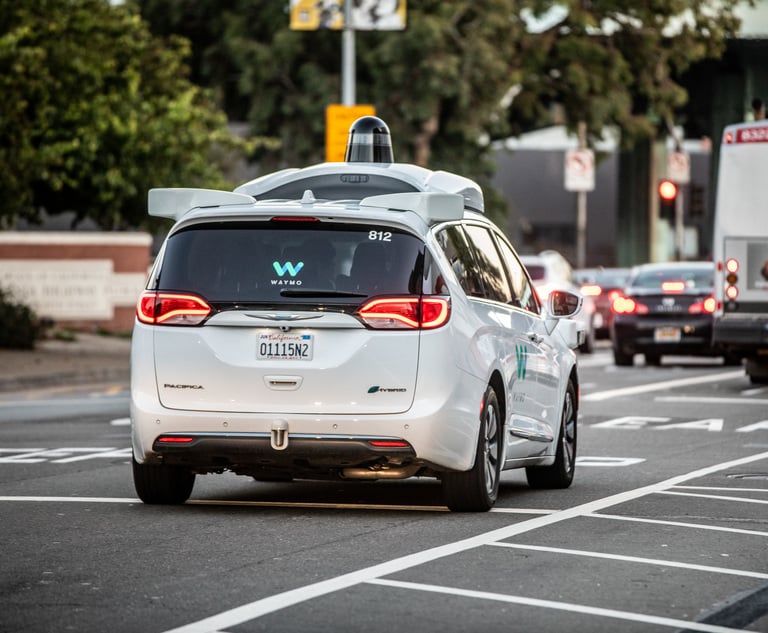Late Changes to California Labor Bill Would Empower City Attorneys
The late amendment appears to give significant litigation power to municipal attorneys in Los Angeles, San Diego, San Francisco and San Jose. Gig companies responded: "We are concerned that this provision effectively weaponizes the statute."
September 10, 2019 at 10:04 AM
4 minute read
 San Francisco City Attorney Dennis Herrera. Photo: Jason Doiy/ALM
San Francisco City Attorney Dennis Herrera. Photo: Jason Doiy/ALM
Silicon Valley gig-economy companies are railing against eleventh-hour amendments to a state labor bill that would reclassify potentially millions of workers in California as employees, calling the changes "punitive" and "capricious."
At issue is new language in Assembly Bill 5 that would allow attorneys for the state's four largest cities to pursue injunctions against companies for any continued classification of their workers as independent contractors and not employees.
The legislation, which is expected to reach the governor's desk by the end of the week, would codify the California Supreme Court's 2018 ruling in Dynamex. That decision made it more difficult for gig companies to reject classifying their workers as employees entitled to wider protections such as minimum wage and benefits.
The late amendment appears to give significant litigation power to municipal attorneys in Los Angeles, San Diego, San Francisco and San Jose to wield against companies that have tried to avoid similar large-scale legal fights with their workers through arbitration agreements.
"We are concerned that this provision effectively weaponizes the statute and shows an intent for the underlying law to be applied in circumstances that circumvent due process," several companies, including Lyft and Uber, said in a Sept. 9 letter to legislative leaders. Three industry groups—the Bay Area Council, the Internet Association and TechNet—also joined the letter.
The letter asks for a one-year delay in the injunctive relief language so industry leaders can continue negotiations with Gov. Gavin Newsom on a possible new classification of workers that would not fall under the traditional definition of employees. Newsom has said he expects to sign A.B. 5.
"It would be punitive and would cause a damaging level of uncertainty for businesses throughout the state to allow industries that have shown good faith efforts on this issue, but have not yet secured a legislative compromise, to be arbitrarily targeted with lawsuits and injunctions," the companies and trade associations said in the letter.
Legislative leaders, however, have shown no interest in delaying the effective date of A.B. 5 or in granting bill exemptions to app-based, on-demand companies. A.B. 5 is awaiting a vote on the Senate floor. The Legislature is scheduled to end its work for the year on Friday.
"These gig companies don't want enforcement," the bill's author, Assemblywoman Lorena Gonzalez, D-San Diego, tweeted Monday night. "Why? Because at least one came to my office and said they'd just continue to litigate it & settle. No one should be above enforcement of wage theft."
City attorneys in Los Angeles and San Francisco have already taken legal action against ride-hailing companies on issues ranging from Uber's 2016 data breach to Uber and Lyft's attempts to shield information about their workers from local agencies.
San Francisco City Attorney Dennis Herrera expressed support for the new language in A.B. 5.
"The state doesn't necessarily have the resources to handle every case," Herrera said in an email. "City attorneys, district attorneys and other local prosecutors are a force multiplier when it comes to protecting workers and consumers. It makes sense to have effective enforcement. You do that by providing local prosecutors with the legal tools to do the job."
A spokesman for Los Angeles City Attorney Mike Feuer said he, too, supports the proposed injunctive authority.
This content has been archived. It is available through our partners, LexisNexis® and Bloomberg Law.
To view this content, please continue to their sites.
Not a Lexis Subscriber?
Subscribe Now
Not a Bloomberg Law Subscriber?
Subscribe Now
NOT FOR REPRINT
© 2025 ALM Global, LLC, All Rights Reserved. Request academic re-use from www.copyright.com. All other uses, submit a request to [email protected]. For more information visit Asset & Logo Licensing.
You Might Like
View All
California's Chief Justice Starts Third Year With Questions About Fires, Trump and AI
4 minute read
Willkie Farr & Gallagher Drives Legal Challenge for Uber Against State's Rideshare Laws
5 minute read

California Lawmakers Reach $50M Deal to Fund Legal Fights Against Trump
3 minute readTrending Stories
- 1'A Death Sentence for TikTok'?: Litigators and Experts Weigh Impact of Potential Ban on Creators and Data Privacy
- 2Bribery Case Against Former Lt. Gov. Brian Benjamin Is Dropped
- 3‘Extremely Disturbing’: AI Firms Face Class Action by ‘Taskers’ Exposed to Traumatic Content
- 4State Appeals Court Revives BraunHagey Lawsuit Alleging $4.2M Unlawful Wire to China
- 5Invoking Trump, AG Bonta Reminds Lawyers of Duties to Noncitizens in Plea Dealing
Who Got The Work
J. Brugh Lower of Gibbons has entered an appearance for industrial equipment supplier Devco Corporation in a pending trademark infringement lawsuit. The suit, accusing the defendant of selling knock-off Graco products, was filed Dec. 18 in New Jersey District Court by Rivkin Radler on behalf of Graco Inc. and Graco Minnesota. The case, assigned to U.S. District Judge Zahid N. Quraishi, is 3:24-cv-11294, Graco Inc. et al v. Devco Corporation.
Who Got The Work
Rebecca Maller-Stein and Kent A. Yalowitz of Arnold & Porter Kaye Scholer have entered their appearances for Hanaco Venture Capital and its executives, Lior Prosor and David Frankel, in a pending securities lawsuit. The action, filed on Dec. 24 in New York Southern District Court by Zell, Aron & Co. on behalf of Goldeneye Advisors, accuses the defendants of negligently and fraudulently managing the plaintiff's $1 million investment. The case, assigned to U.S. District Judge Vernon S. Broderick, is 1:24-cv-09918, Goldeneye Advisors, LLC v. Hanaco Venture Capital, Ltd. et al.
Who Got The Work
Attorneys from A&O Shearman has stepped in as defense counsel for Toronto-Dominion Bank and other defendants in a pending securities class action. The suit, filed Dec. 11 in New York Southern District Court by Bleichmar Fonti & Auld, accuses the defendants of concealing the bank's 'pervasive' deficiencies in regards to its compliance with the Bank Secrecy Act and the quality of its anti-money laundering controls. The case, assigned to U.S. District Judge Arun Subramanian, is 1:24-cv-09445, Gonzalez v. The Toronto-Dominion Bank et al.
Who Got The Work
Crown Castle International, a Pennsylvania company providing shared communications infrastructure, has turned to Luke D. Wolf of Gordon Rees Scully Mansukhani to fend off a pending breach-of-contract lawsuit. The court action, filed Nov. 25 in Michigan Eastern District Court by Hooper Hathaway PC on behalf of The Town Residences LLC, accuses Crown Castle of failing to transfer approximately $30,000 in utility payments from T-Mobile in breach of a roof-top lease and assignment agreement. The case, assigned to U.S. District Judge Susan K. Declercq, is 2:24-cv-13131, The Town Residences LLC v. T-Mobile US, Inc. et al.
Who Got The Work
Wilfred P. Coronato and Daniel M. Schwartz of McCarter & English have stepped in as defense counsel to Electrolux Home Products Inc. in a pending product liability lawsuit. The court action, filed Nov. 26 in New York Eastern District Court by Poulos Lopiccolo PC and Nagel Rice LLP on behalf of David Stern, alleges that the defendant's refrigerators’ drawers and shelving repeatedly break and fall apart within months after purchase. The case, assigned to U.S. District Judge Joan M. Azrack, is 2:24-cv-08204, Stern v. Electrolux Home Products, Inc.
Featured Firms
Law Offices of Gary Martin Hays & Associates, P.C.
(470) 294-1674
Law Offices of Mark E. Salomone
(857) 444-6468
Smith & Hassler
(713) 739-1250






